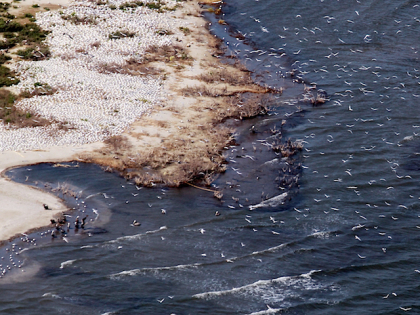http://dfw.cbslocal.com/2013/11/14/gulf-states-get-first-113m-from-oil-spill-pleas/
By Jeff Amy, Associated Press
Updated 1:08 pm, Thursday, November 14, 2013

Birds fly over an island that was threatened by the massive Deepwater Horizon/BP oil spill on May 9, 2010 in Gulf of Mexico. (credit: Joe Raedle/Getty Images)
JACKSON, Miss. (AP) — The five states that border the Gulf of Mexico are getting $113 million to improve the environment.
The grants, announced Thursday by the National Fish and Wildlife Foundation, are the first small chunk of $2.5 billion that BP PLC and Transocean Ltd. were fined as a result of criminal pleas last year following the 2010 Gulf oil spill.
Louisiana is getting $67.9 million, Florida $15.7 million, Alabama $12.6 million, Texas $8.8 million and Mississippi $8.2 million.
Over the next five years, the foundation’s Gulf Environmental Benefit Fund will receive about $1.3 billion for barrier island and river diversion projects in Louisiana, $356 million each for natural resource projects in Alabama, Florida, and Mississippi, and $203 million for similar projects in Texas.
Thursday’s announcement spent only part of the first $158 million that the companies paid earlier this year. Another $353 million will be paid by February, but the largest payments will come in later years, said Thomas Kelsch, who leads the Gulf Environmental Benefit Fund for the foundation.
Louisiana will use its coastal restoration plan as a guide, foundation officials said. “There’s not a requirement that the funds go directly to the habitats that were affected by the spill,” Kelsch said. In Louisiana, the money will go for planning and engineering to restore coastal islands and divert Mississippi River water and sediment into vanishing marshlands, part of the state’s fight to stop its coastline’s erosion.
Environmental advocates applauded the $40.4 million for a diversion from the west bank of Mississippi south of New Orleans to the Barataria estuary. That diversion is supposed to be a pilot project that will guide the design of others in the future.
“The Barataria Basin has one of the highest rates of land loss in the world, and this large-scale wetland restoration project is crucial to reversing that trend,” the Environmental Defense Fund, National Audubon Society, National Wildlife Federation, Coalition to Restore Coastal Louisiana and the Lake Pontchartrain Basin Foundation said in a joint statement.
Money in other states will generally go to improve natural areas and create better habitats for animals. For example, Mississippi will use $3.3 million to uproot invasive land and wetland plant species in its 26 coastal preserves, replanting with native species.
In Florida and Texas, foundation officials said they tried to choose projects closest to the spill zone. That means projects were generally in Florida’s western Panhandle and on the eastern part of Texas’ coast.
Follow Jeff Amy at http://twitter.com/jeffamy
Special thanks to Richard Charter